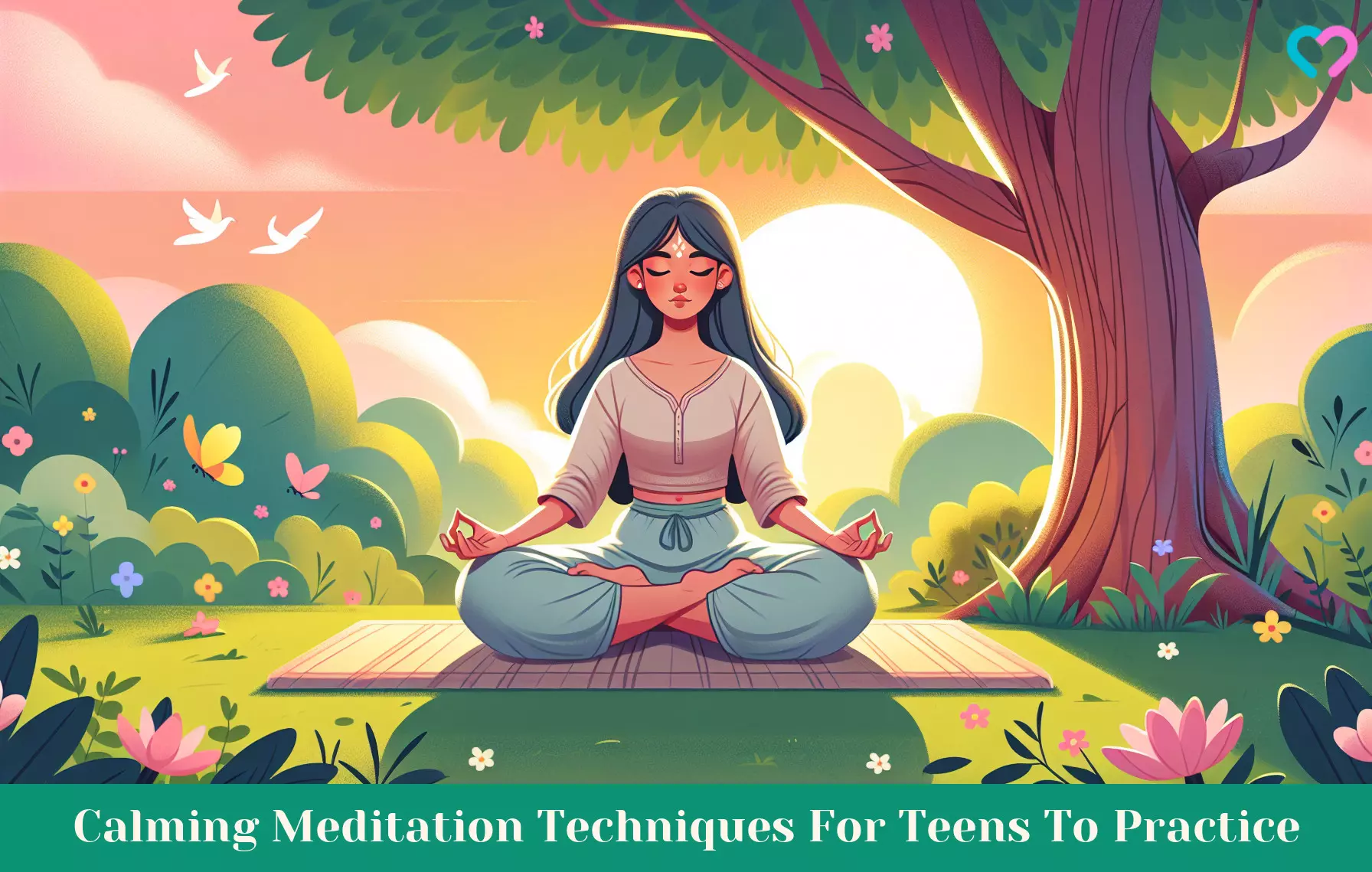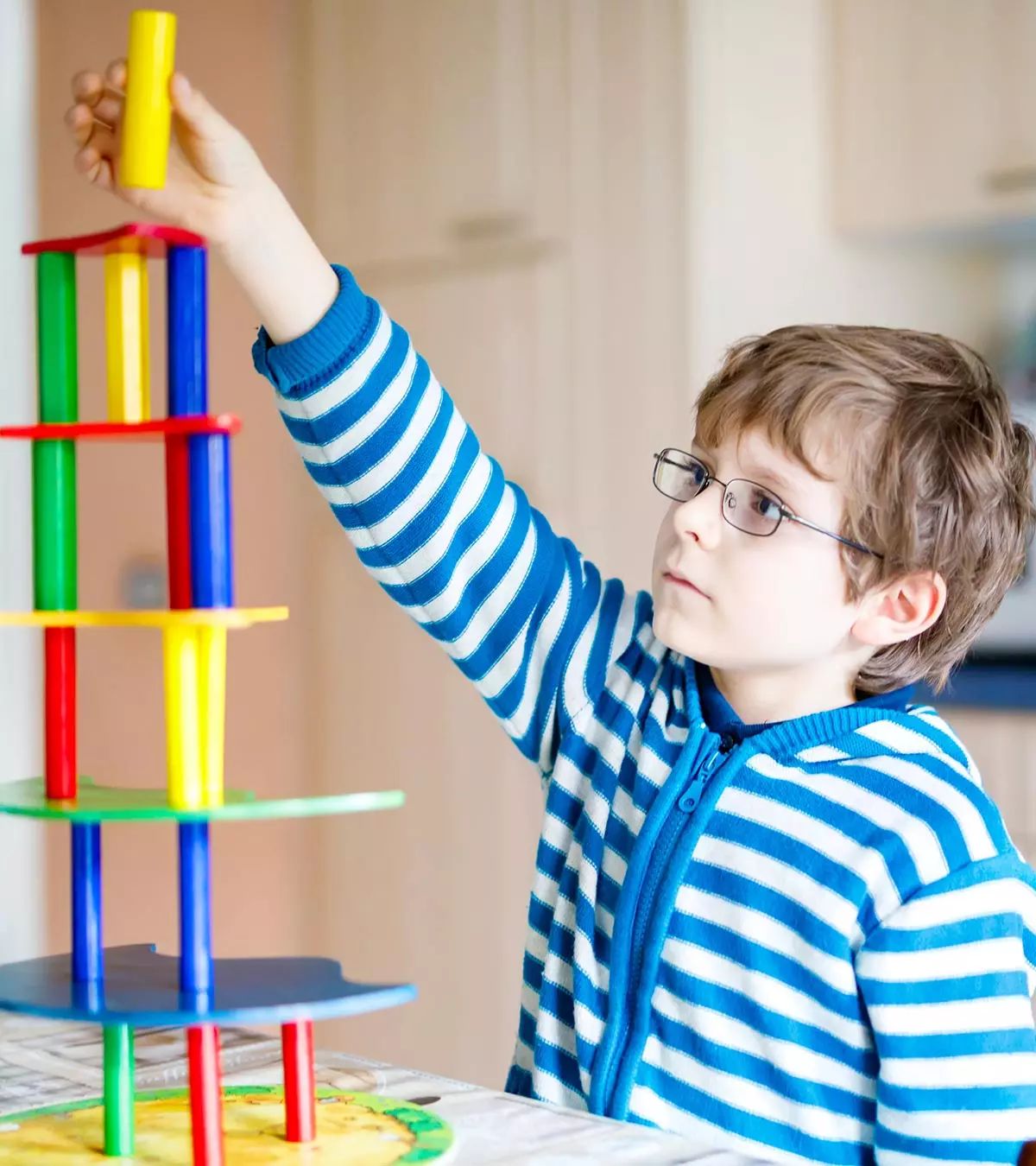
Meditation for teens helps them improve their concentration and focus and reduce stress levels. In addition, breathing techniques and mindfulness promote physical and psychological well-being in teens. Regular meditation can also improve cardiovascular and neurological health. However, more research is needed to determine the specific benefits of meditation for teenagers (1).
Relaxation techniques and meditation may help most teens cope with the transition from childhood to adulthood. They help in emotional regulation and mindfulness, which helps teens combat stress effectively. Even though all teens benefit from meditation, you may consider more active techniques under the guidance of an expert for teens who have mental health issues or had some trauma. Read on to learn the benefits of meditation for teens and a few techniques.
Key Pointers
- Teenagers can experience improved sleep, concentration, lower anxiety, and enhanced emotional control with the help of meditation.
- Techniques such as number counting, backward counting, deep breathing, and sitting still can effectively reduce stress.
- To become more in-tuned with their thoughts and emotions, teenagers can use techniques such as thought counting and closing the gates.
- The practice of love/kindness meditation or walking in silence can help teenagers clear their minds of negativity.
- Practicing meditation can aid teenagers in managing stress and anxiety during their transition from childhood to adulthood.
Why Teenagers Should Learn Meditation

Image: Shutterstock
The teenage years can be a time of conflict and stress. Teenagers are often vulnerable and teen peer pressure and stress can make them develop bad habits. It is also a valuable time to choose and prepare for their career, and they may have worries about their scores in exams and competitive examinations.
Teenagers may also find it challenging to transition from school to college due to new settings and responsibilities.
Incorporating meditation and mindfulness exercises into their routine can be an effective self-care practice for teenagers, as it has been shown to promote a sense of calmness and alleviate anxiety and stress, leading to increased inner peace. Additionally, regular meditation can enhance their ability to concentrate, remember information, and attain mental clarity, all of which are crucial for academic success.
 Point to consider
Point to considerPossible Benefits Of Meditation For Teenagers

Image: Shutterstock
Meditation may benefit teens by (2) (3):
- Improving sleep: Teen stress and anxiety could cause insomnia. Meditation can help calm the mind. It could help them to have quality sleep, which is required for the proper functioning of the body and mind.
- Enhancing attention: Regular practice of meditation may help to improve concentration and, thus, help teens learn better. Thus, regular meditation can have a direct effect on academic performance.
- Lowering anxiety: A few meditation techniques help reduce negative thoughts that cause anxiety and also help with emotional regulation.
- Reducing the possibility of alcohol or drug abuse: Teens who practice meditation may have low levels of stress, good resilience, and coping skills. They may not easily get influenced by peers who take drugs or alcohol.
- Controlling emotions: Teens may have emotional issues due to stress and hormonal factors. Meditation may help them with emotional regulation and provide tranquility and serenity in their lives. Teens who meditate may be more aware of their thoughts and emotions than others.
Karthik Bhandary, a 19-year-old teen, shares how meditation helped him control his emotions and feel relaxed. He says, “I am a teenager, so it is not surprising that I am very irritable, and I get angry very easily. I heard that you can control your emotions if you meditate. So, I started with ten minutes for ten days, not more than that.
“For the first two to three days, it was uncomfortable… After ten days of familiarizing and cultivating the habit I increased the time by five minutes and started doing it for 15 minutes… In these ten days, I had increased my focus a tad bit and had fewer thoughts than I had at the start… After doing this for 20 days straight, the last ten days were a cakewalk. Improvements that I found… I was able to control my emotions (Anger importantly), increased focus, became more energetic, bit more optimistic than usual, stress levels decreased, and felt more relaxed (ⅰ).”
Meditation Techniques For Teens
The following meditation techniques can be useful for teens:
1. Number counting
This technique is one of the best ways to reduce stress. You may ask your teen to count from 1 to 10. They should keep repeating it until they feel they are free of any unwanted thoughts. This is one of those therapeutic activities for teens that may help them tackle unwanted thoughts that often come to their mind.
2. Backward counting
The backward counting meditation can be done in any relaxed position. You may ask your teen to count from 100 to 1. This demands total concentration, and they could be more focused on reaching 1.
This is an excellent technique to improve your teen’s concentration and reduce unnecessary worries.
3. Thought counting
You may ask your child to sit in a relaxed position and count their thoughts using small balls, beads, seeds, etc. Each time they get a thought, they should move one ball, bead, etc., to another group.
Ask them to try for a few minutes, and you may notice that the number of thoughts decreases after some time.
4. Closing the gates
Also called yoni mudra, this is the yoga practice of closing the senses. This method involves closing the eyes, ears, mouth, and nose with fingers to block all sensory perception.
You can ask your teen to close the sensory organs with their fingers in the following way:

Image: Shutterstock
- Ears: thumbs
- Eyes: index fingers
- Nose: middle fingers
- Ring finger: above lips
- Little finger: under the lips
You may ask your teen to relax their elbows and shoulders and take deep breaths without feeling the breathing sound.
After a few minutes, they may open their ears and listen to the sounds around them. Ask your teen to gently close the sensory organs and not in a way that could cause pain on the eye or block the nasal passage (4).
5. Deep breathing
Ask your teen to close their eyes, sit straight, and do deep breathing or abdominal breathing
. They should breathe in deeply following the sound of the breath from the nose to deep down and breathe out gently after a few seconds. Next, ask them to listen to the sounds around them and not focus on their thoughts (5). This technique can be practiced by listening to or feeling your heartbeat as well.
 Quick tip
Quick tip6. Sitting still
This is an ideal meditation technique to strengthen the bond between you and your teen, as it requires patience and encourages both of you to slow down and be present at the moment. Sit with your backs and heads leaning on each other and take slow, deep synchronized breaths. Feel each other’s breathing and think of happy thoughts.
7. The circle of ‘what I want in life’
Draw a circle in a paper, and ask your teen to write down the dreams they want to achieve in their life. You may also ask them to write what they do not want in life outside the circle.
You may ask them to write down their dreams in different colors or in whichever way they want. Encourage them to frame it and hang it on their wall and take a look at it often to remind themselves of their dreams. You may also ask them to keep adding to it when they think it’s needed. This meditation exercise can promote motivation, perseverance, discipline, dedication, and commitment in a teen’s life and inspire them to live a meaningful life.
8. Love/ kindness meditation
This is more demanding than the other techniques. It involves forgiveness, kindness, empathy, compassion, non-judgment, and love towards someone who had hurt you in the past.
You may ask your child to sit comfortably, close their eyes, and remember all the good times they had. They can also repeat something like “let me enjoy happiness” as a mantra.
Next, tell your teen to forgive and feel kind towards the person who hurt them. This compassion meditation can fill your teen with positive thoughts (6).
9. Feeling the sky
You can ask your teen to close their eyes and take deep breaths and broaden their creativity, imagination, and visualization skills. Tell them to imagine the blue sky with the clouds passing by. Explain to them that clouds will pass by, but the sky will always remain constant—in other words, the clouds can’t change the sky forever. Tell them that all worries are like clouds, and they are the sky.
Let them know that all worries are temporary. This meditation may help boost your teen’s confidence and self-esteem, and also promote self-acceptance and self-love.
10. Walking in silence

Image: Shutterstock
Walking in silence can be practiced as meditation and is good for self-reflection. A park or beach is an excellent place to do this meditation. Ask your teen to feel each step they take and be aware of themselves and the things around them (7).
11. Mindfulness
The purpose of this technique is to bring one’s attention to experiences occurring in the present moment without judgment.
There are several meditation techniques for teens, and you may choose one according to your child’s needs and convenience. You could also practice it with them and benefit from it.
Teenage is the time for rapid physical and mental growth, which may make their life stressful. Meditation for teens can have therapeutic effects as it offers stress relief, encourages positive thinking, and fosters self-awareness during their transition from childhood to adulthood. The techniques can help improve sleep, concentration, and self-control. Meditation techniques such as mindfulness, deep breathing, thought counting, or simply sitting still or walking in silence with no distractions are methods of self-care for teens to make them self-aware and mentally strong. Feel free to seek help from an expert or meditation guide to get the best out of the techniques.
Infographic: How Can Teens Meditate?
The increased academic pressure, social responsibility, and pubertal changes make teens prone to becoming stressed. In teens, meditation helps reduce stress, improves sleep, and helps control emotions, among other benefits. Check out the infographic below for some simple meditation techniques you can teach teens.

Illustration: Momjunction Design Team
Frequently Asked Questions
1. At what age teens can start meditation?
Meditation is a simple relaxation technique that a teen can start at any age. Children as young as three or four can start practicing meditation and learn mindfulness to manage stress and anxiety properly.
2. What is the ideal time to meditate?
Maintaining a routine and practicing meditation are more important. Ideally, the morning is the best time to meditate. However, a child can meditate any time later in the day.
3. How long can teens meditate?
The time and frequency of meditation vary depending on the teen’s schedule and meditation practice type. However, pediatricians recommend teens and adults meditate for 5 to 45 or more based on their preferences (8).
4. Where should I meditate?
Meditation feels fulfilling in a calm and serene environment. You may make a special meditation area in your room or assign a room for the purpose. Make sure the area or room is clean and neatly organized. A rooftop or balcony, especially if the early morning sun is available, can be a good option. If you wish to meditate outdoors, you can choose a garden or a holy place. It is also a wonderful idea to select a place with rivers and streams as fountains, as the sound of flowing water provides added calmness and inspires the mind to remain in the present (9).
5. How can teens meditate with guided meditation apps?
Teens often do not have a clue where to begin their meditation journey and how frequently they should meditate. Guided meditation apps, such as Calm, Headspace, Happier, and Buddhify, can help them get started interactively. The apps offer routines ranging from 3-4 minutes to longer than an hour and are accompanied by calming voiceover guides targeted for anxiety, stress, and sleep issues.
Illustration: Calming Meditation Techniques For Teens To Practice

Image: Dall·E/MomJunction Design Team
Learn how to relax and reduce stress with this video on mindfulness meditation for teens. Take a break from your busy day and find inner peace with this easy and effective practice.
Personal Experience: Source
MomJunction articles include first-hand experiences to provide you with better insights through real-life narratives. Here are the sources of personal accounts referenced in this article.
i. My 30 Day Meditation Experience.https://karthikbhandary2.medium.com/my-30-day-meditation-experience-b02e50f12ad
References
1. Julie Corliss; Mindfulness meditation may ease anxiety, mental stress; Harvard Medical School(2014).
2. Meditation: In Depth; National Center for Complementary and Integrative Health
3. Malka Main; Mindfulness Meditation and Adolescent Well-Being; University of Washington (2018).
4. How to Do Yonimudra Step by Step and Benefits of Yonimudra; The yoga Institute
5. Diana Winston; A 5-Minute Breathing Meditation To Cultivate Mindfulness; Mindful (2016).
6. Compassion Meditation; Greater Good in Action
7. What is walking meditation?; Wildmind meditation
8. Just Breathe: The Importance of Meditation Breaks for Kids; American Academy of Pediatrics
9. 5 Best Places for Meditation; Mindworks
11. Learning diaphragmatic breathing; Harvard Medical School
Community Experiences
Join the conversation and become a part of our nurturing community! Share your stories, experiences, and insights to connect with fellow parents.
Read full bio of Dr. Shashidhar A
Read full bio of Dr Bisny T. Joseph
Read full bio of Swati Patwal
Read full bio of Apoorva K
















